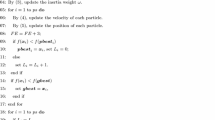Abstract
This paper proposes a two sub-warms particle swarm optimization algorithm (TSPSO) and its iteration equations. The new algorithm assumes that particles are divided into two sub-swarms. The two sub-swarms have different move directions. One sub-swarm moves toward the global best position. Another moves in the opposite direction. Not only its own move experience and the best individual’s position of its own sub-swarm, but also the global best position of the whole swarm can affect each particle’s move in every iteration. If the fitness of the global best position can’t be improved for fifteen successive steps, the particles of the two sub-swarms are exchanged. At the same time, the worst individual of one sub-swarm is replaced with the best individual of another. Then, both TSPSO and PSO are used to resolve ten well-known and widely used test functions’ optimization problems. Results show that TSPSO has greater optimization efficiency, better optimization performance and more advantages in many aspects than PSO.
Preview
Unable to display preview. Download preview PDF.
Similar content being viewed by others
References
Kennedy, J., Eberhart, R.C.: Particle Swarm Optimization. In: Proc. IEEE Int. Conf. on Neural Networks, Perth, WA, Australia, pp. 1942–1948 (1995)
Eberhart, R.C., Kennedy, J.: A New Optimizer Using Particle Swarm Theory. In: Proc. the Sixth Int. Symposium on Micro Machine and Human Science, Nagoya, Japan, pp. 39–43 (1995)
Shi, Y., Eberhart, R.C.: Parameter Selection in Particle Swarm Optimization. In: Evolutionary Programming VII: Proceedings of The Seventh Annual Conference on Evolutionary Programming, New York, pp. 591–600 (1998)
Eberhart, R.C., Shi, Y.: Particle Swarm Optimization: Developments, Applications and Resources. In: Proc. 2001 Congress on Evolutionary Computation, Seoul, South Korea, pp. 81–86 (2001)
Kennedy, J., Eberhart, R.C.: Swarm Intelligence. Morgan Kaufmann Publishers, San Francisco (2001)
Van Frans, D.B., Engelbrecht, A.P.: Training Product Unit Networks Using Cooperative Particle Swarm Optimizers. In: Proc. of The Third Genetic and Evolutionary Computation Conference, San Francisco, USA (2001)
Parsopoulos, K.E., Vrahatis, M.N.: Recent Approaches to Global Optimization Problems Through Particle Swarm Optimization. Natural Computing 1, 235–306 (2002)
Lu, W.Z., Fan, H.Y., Lo, S.M.: Application of Evolutionary Neural Network Method in Predicting Pollutant Levels in Downtown Area of Hong Kong. Neurocomputing 51, 387–400 (2003)
Author information
Authors and Affiliations
Editor information
Editors and Affiliations
Rights and permissions
Copyright information
© 2005 Springer-Verlag Berlin Heidelberg
About this paper
Cite this paper
Chen, G., Yu, J. (2005). Two Sub-swarms Particle Swarm Optimization Algorithm. In: Wang, L., Chen, K., Ong, Y.S. (eds) Advances in Natural Computation. ICNC 2005. Lecture Notes in Computer Science, vol 3612. Springer, Berlin, Heidelberg. https://doi.org/10.1007/11539902_63
Download citation
DOI: https://doi.org/10.1007/11539902_63
Publisher Name: Springer, Berlin, Heidelberg
Print ISBN: 978-3-540-28320-1
Online ISBN: 978-3-540-31863-7
eBook Packages: Computer ScienceComputer Science (R0)




